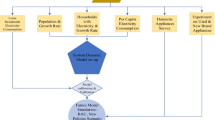Abstract
Airconditioners are the appliance with the largest share of electricity consumption in Japanese households. In our preceding study, it was found that the high-end model (with the highest environmental performance with regard to Global Warming Potential and landfill consumption) turns out to be the one with the lowest life cycle cost, and the low-end model (with the lowest environmental performance) the one with the highest life cycle cost. This paper is concerned with investigating if the above finding still holds for more recent data, say for 2005, and also in analyzing possible changes that have occurred since 2002 from the perspective of eco-efficiency. Compared with the previous results, we notice a significant reduction in the cost at the use phase due to the convergence in efficiency at the use phase, and the resulting reduction in life-cycle costs among alternative models. There was thus a significant increase in eco-efficiency between 2002 and 2005 in terms of both CO2 and landfill consumption.
Access this chapter
Tax calculation will be finalised at checkout
Purchases are for personal use only
Preview
Unable to display preview. Download preview PDF.
Similar content being viewed by others
4 References
Agency for Natural Resources and Energy, Government of Japan. 2006. Energy demand in Japan http://www.enecho.meti.go.jp/topics/energy-in-japan/energy2006Epdf/p34
Yokota, K., Matsuno, Y., Yamashita, M. and Adach, Y., 2003, Int J LCA 8-3 129–136.
Nakamura, S. and Kondo, Y., 2006, Int J LCA 11-5, 305–314.
Kondo, Y. and Nakamura, S., Int J LCA, 9-4, 236–246.
Nakamura, S., and Kondo Y., 2002, J Ind Ecol 6-1, 39–63.
Nakamura S. and Kondo Y., 2005, Ecol Econ, 57-3, 494–506.
Rebitzer, G., 2002, In: Seuring S, Goldbach M (eds.) Cost Management in Supply Chains. Heidelberg: Physica-Verlag, 128–146
Special Issue on Eco-efficiency, J Ind Ecol 9-4, 2005
Rüdenauer I., et al, in [8], 105–116.
http://plaza.rakuten.co.jp
http://www.f.waseda.jp/nakashin
Management and Coordination Agency, Government of Japan, 2004, 2000 Input-Output Tables. Tokyo: The Federation of National Statistics Associations
Author information
Authors and Affiliations
Editor information
Editors and Affiliations
Rights and permissions
Copyright information
© 2007 Springer-Verlag London Limited
About this paper
Cite this paper
Nakamura, S. (2007). Evaluating eco-efficiency of appliances by integrated use of hybrid LCA and LCC tools. In: Takata, S., Umeda, Y. (eds) Advances in Life Cycle Engineering for Sustainable Manufacturing Businesses. Springer, London. https://doi.org/10.1007/978-1-84628-935-4_77
Download citation
DOI: https://doi.org/10.1007/978-1-84628-935-4_77
Publisher Name: Springer, London
Print ISBN: 978-1-84628-934-7
Online ISBN: 978-1-84628-935-4
eBook Packages: EngineeringEngineering (R0)




